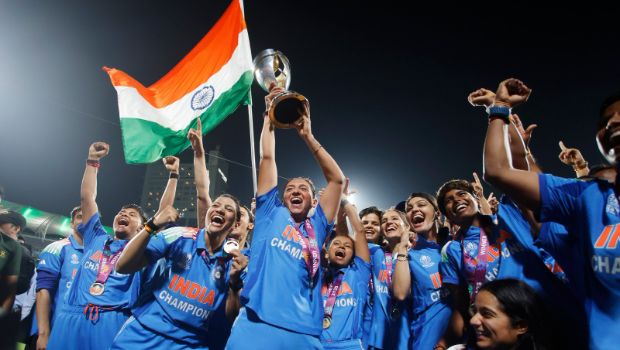Will this victory to do Indian women’s cricket what the 1983 World Cup did for the men’s team? There is reason to believe it will.
After the heartbreak of losing ODI World Cup finals in 2005 and 2017, and then the T20 World Cup final in 2020, the Indian women’s team finally got their hands on an ICC trophy to become the first to ever win a World Cup. What transpired at the DY Patil Stadium in Navi Mumbai – for all practical purposes the home of women’s cricket in India – was the stuff of dreams. But it was bloody hard work for Harmanpeet Kaur and her team-mates.
A home World Cup. The pressure of being hosts and with so much talent in its ranks. A good start to the tournament, but then three losses in a row. Familiar frailties simmered and then threatened to boil over and ruin another World Cup campaign. But Harmanpreet’s team got its act together in the nick of time and defeated New Zealand to get the last semi-final spot, but then lost their second most successful player of the tournament in young Pratika Rawal, who injured her ankle in the rain-hit match with Bangladesh.
The selectors called up Shafali Verma, who they had dropped from ODIs in 2024. The 21-year-old slotted right into India’s 11 for the semi-final against defending champions Australia, and was out cheaply. But she delivered in the final with a performance that will do down in folklore: a career-best 87 off 78 balls and then two vital wickets after her captain, in one of those gut-feel moments, tossed Shafali the ball.
After the win, Shafali accepted her Player-of-the-Final award and said “God has sent me here to do something nice”.
Divine intervention was also referenced after that epic semi-final victory, also at the DY Patil Stadium, by Jemimah Rodrigues whose unbeaten 127 will forever be etched in Indian cricket history. “I just felt God scripted everything. I believe if you do the right things, with right intentions, he always blesses,” said the 25-year-old.
But the truth of the matter is that sheer hard work, immense resilience and an unwavering spirit won this team its first World Cup. It takes pain and lows to find ways upwards. The core of this team, with so much talent, had committed familiar errors in 2020, 2022 and 2024. They could not face further soul-crushing defeat, and so willed themselves to somehow achieve the near impossible: defeat Australia in a World Cup semi-final, that too chasing a record target of 339.
With all due respect to South Africa, after that night, it did seem like this team would win the trophy two days later. When teams are stretched to their limits in such knockouts, that too in front of a cricket-mad home audience, and then pull off the absurd, it does something to them internally. And that’s why, despite only getting to 298/7 when at one stage 350 looked well within their reach, Harmanpreet and her team-mates knew they had enough on the board.
To finally win a World Cup is a tribute to every member of the team, the coaches, the support staff, the BCCI, the cricketing structure in India and, of course, the families who back their loved ones in the face of challenges and difficulties. The coaching of Amol Muzumdar has been critical to keeping these players motivated, and, ultimately, in winning the country’s first World Cup.
Sunday night was historic, and very emotional. Harmanpreet spoke of the difficulties faced during the tournament, specifically after three losses in a row. Smriti Mandhana spoke of not sleeping properly for 45 nights. Richa Ghosh addressed the matter of home pressure. Deepti Sharma, the Player of the Tournament, and who scored a fifty and took five wickets in the final, hoped that this victory would bring more matches for Team India. Amanjot Kaur dedicated the win to Rawal, the young opener who topped 300 runs before her injury, and who joined the team in celebrating with the World Cup, from a wheelchair.
At 36, Harmanpreet may not play on much longer but she has shaped a superb unit. Smriti, Jemimah and Deepti are players who have flourished under her leadership. The likes of Pratika, Shafali, Richa, Kranti Gaud and Shree Charani make for an exciting bunch. And, critically, there is plenty of leadership material visible inside this squad.
What this World Cup victory could do to these extremely talented cricketers is exciting to ponder. Just as in 2007, when the T20 format exploded following the success of MS Dhoni’s team at the inaugural World Cup in South Africa, so too should this result boost women’s cricket. Australia have dominated women’s cricket for years, but this could be India’s time.


























